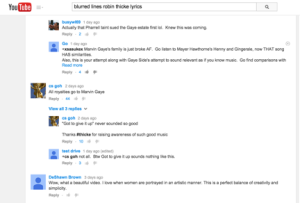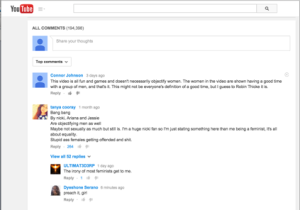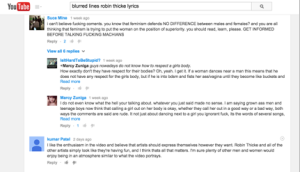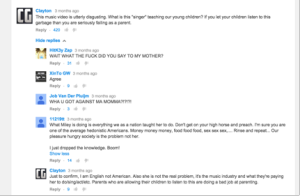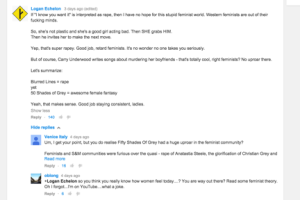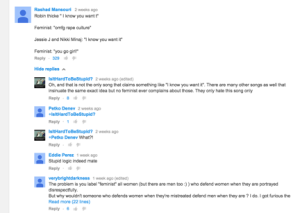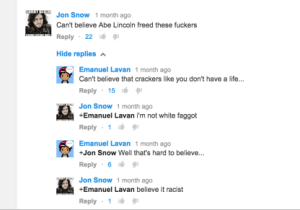Most people assumed the development of the Internet would allow people to communicate in an environment where race didn’t play any role because of hidden identities. However, with profile pictures and usernames, people can assume the identities of other users on various social sites. One site that I’ve seen many people make assumptions on is YouTube. Many accounts on YouTube consist of only a profile picture and username, which people use to guess others identities. I believe these assumptions can lead users to post biased responses to comments on videos that can target the other persons ‘beliefs.’
This idea led me to develop the question; how do people respond to comments on YouTube videos based off of who they assume the commenter’s identity to be? In order to collect proper data, I had to specify which videos I was going to analyze. I wanted to choose controversial videos that most people know about, and which I could also relate to the topics we talk about in class. I decided on music videos that objectify women, since that is a big topic in class and in the entertainment industry. In order to gain diversity in my research, I chose a black male (2 Chainz), white male (Robin Thicke), black female (Nikki Minaj), and white female (Miley Cyrus) music artists.
I created three YouTube accounts, each with different identities. I didn’t want gender playing a role, so all of the identities were males. I created a black male named DeShawn Brown, white male named Connor Johnson, and Indian male named Kumar Patel. I proceeded with the research by commenting similar things for each identity on the music videos.The comments I posted were mainly about enjoying the videos and believing that the nudity was an artistic quality that the artists were entitled to include. I thought this would lead people to reply saying that I was basically saying its okay to objectify women. However, I didn’t get responses for any of my identities on any of the videos. This led me to change my research method to evaluating the comments that are currently on those videos, and determine whether or not people make assumptions on the identity of other users.
Before analyzing current comments on the music videos, I realized a pattern among the comments that I had posted through my fake identities. When I was signed in on Connor Johnson’s account, the comments that I posted through that account were the first ones in the comment section. However, when I was logged in on Kumar Patel’s or DeShawn Brown’s accounts, the comments I posted through those accounts came up later in the list of comments. I’m not sure if this is random, however, it does seem odd that the white male’s comments would be easily accessible through his account, while the others were harder to find for the users after they posted them. Of course, I only used three accounts, so this pattern can only be verified if found among a large number of accounts.
On the various videos, I analyzed the first two pages of comments. Overall, I have to say that I didn’t see many biased responses based off of what various users believed other users identities to be. While I did find a couple comments here and there with identities of users being an issue within conversations, the majority consisted of simply arguing over topics of the music videos.
Wrecking Ball, by Miley Cyrus, contained comments that mainly argued over the topic of Miley being a role model for many young girls. Most people didn’t feel that it was right for her to portray nudity to all of her viewers. I discovered on comment in which one user, 11219tt, assumes the ethnicity and beliefs of another user, Clayton (presented in the image below). The assumed identity of Clayton ended up being incorrect.
Anaconda, by Nikki Minaj, mainly consisted of comments about Nikki’s fake butt and boobs. They didn’t have much content to them or intellectual opinion, which is expected. I didn’t find any comments in which others speculated the identities of other users.
Blurred Lines, by Robin Thicke, had comments that fought over the topic of feminism. I found this odd because all of the other videos had objectification of women, but they didn’t have many feminists commenting on them. The screenshots I took were of two identities arguing that the video isn’t about rape. Both of these identities are of males. Both males are of different races, however, the responses to their comments are focused purely on their gender.
The last video I analyzed was Birthday Song, by 2 Chainz. Despite the fact that this video sexualized women the most, it was the most liked out of the four. This is mainly because 2 Chainz is known for his random and explicit videos. He has a specific audience, which means that the comments consisted of sarcasm and not many intellectual conversations. While most people talked about the lyrics in the song, one person decided to comment on race. You can see in the screenshot that a racist comment from Jon Snow led another commenter, Emanuel Lavan, to leave a response about his identity. The assumed identity was incorrect.
You can see that most people are incorrect when they try and assume what another person’s beliefs and race are through YouTube accounts. My research didn’t find as many speculations on identities as I believed there to be, which either means that people don’t look at race as much anymore, or I simply didn’t choose the right videos to observe. Also, while all of the music videos I chose had objectification of women, they all had totally different audiences and arguments. It seems that the comments section consists of a specific topic of argument, and people are usually too focused on that topic to worry about the identities of other users. If any assumptions were made in the comments section of the videos I evaluated, it was most likely unconsciously done.
